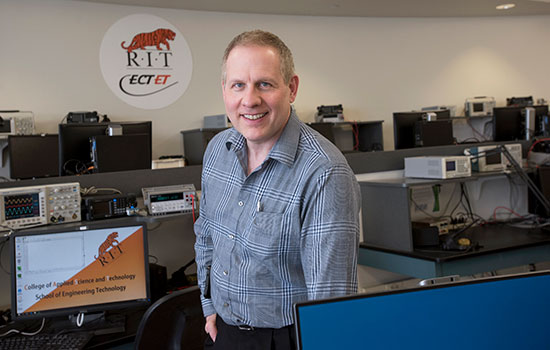Associate professor brings positive energy to ECTET courses
A. Sue Weisler
Steven Ciccarelli is being honored with a 2018 Eisenhart Award for Excellence in Teaching.
Steven Ciccarelli’s course in DC Circuits—about understanding energy flow through electronic devices—is a lot like his teaching style—direct and energetic with positive results.
As associate professor in the electrical engineering technology program, and an RIT alumnus, Ciccarelli brings to the classroom a rich mix of industry experience in analog/RF circuit design and wireless communications. For this work and its results, he is being honored with a 2018 Eisenhart Award for Outstanding Teaching.
Ciccarelli participated in different teaching workshops and learning communities when he saw that the “lecture-homework-figure it out on your own” paradigm was becoming outdated.
“When I began, I taught the way I was taught, which was mostly lecture, not a lot of feedback from students, and it seemed to work out OK,” said Ciccarelli. “But people learn more by doing, by engaging with other people, so I changed my teaching techniques over the years.”
His courses for first- and second-year engineering technology students changed from predominantly lecture to a combination of mini-lectures, in-class problem-solving and team projects. He teaches foundational courses in circuit design and electronics as well as communications and digital signal processing.
Engineering education is continuing to shift from traditional lecture to more active learning collaborations among faculty and students, and one part of those collaborations includes peer learning. Several of Ciccarelli’s upper-level students who mastered topics and had been trained in teaching techniques work with him as teaching assistants for labs and recitations. Groups stay on task, and additional mentors are always available. This strategy is reaping results in increased learning and retention. And for teaching assistants who aspire to follow in Ciccarelli’s footsteps in the classroom, they have subject-matter knowledge and teaching experience that could influence future classes of engineers.
His continual improvement in the classroom extends to his own education. This year, Ciccarelli plans to complete his Ph.D. through the University of Buffalo’s Curriculum, Instruction and the Science of Learning Program. His dissertation research about effective teams was based on interactions he observed in his courses. Instead of pairing students in labs, a traditional practice, Ciccarelli routinely places four students together. During each session, he assigns different roles so that students learn alternate responsibilities and how different ideas and skills contribute to problem-solving. This approach helped students best in meeting learning objectives.
“It was an eye opener,” he said. The results were presented to engineering and engineering technology faculty at the American Society of Engineering Education conference last spring. “Sometimes you can see clearly when students get it, that they understand the material. Others, you may need to go back and forth a few times asking questions and probing for solutions before they get it,” Ciccarelli said. “When they have that ‘ah-ha’ moment, I feel like I’ve accomplished something. It lights me up.”











